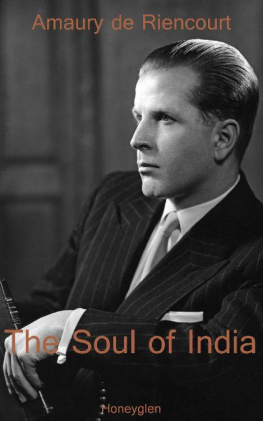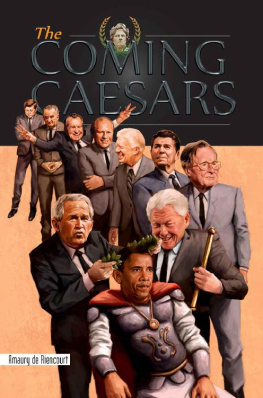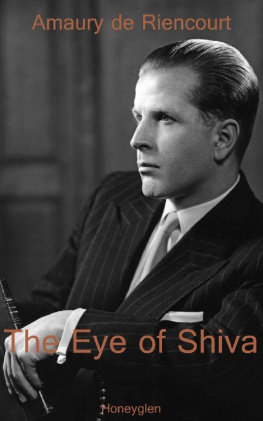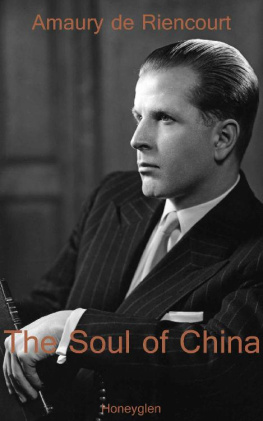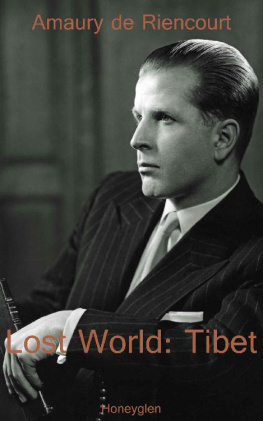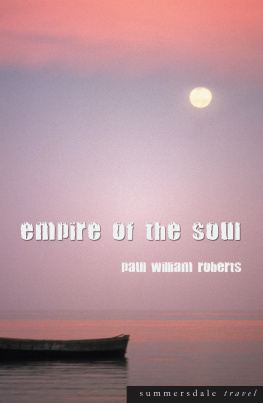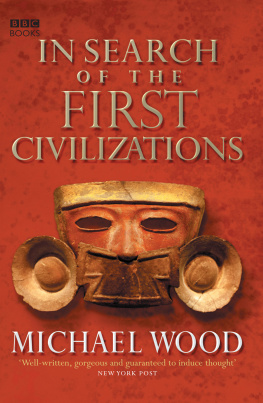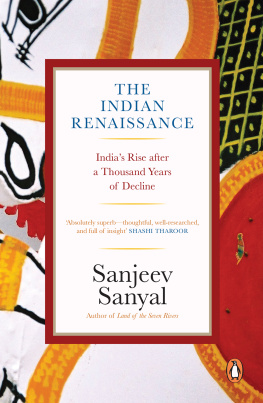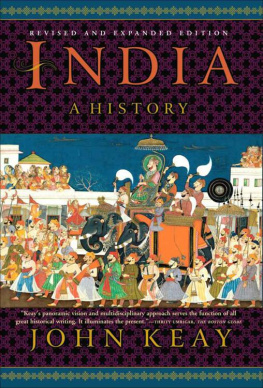THE SOUL OF INDIA
By the same author
ROOF OF THE WORLD
THE COMING CAESARS
THE SOUL OF CHINA
THE AMERICAN EMPIRE
WOMAN AND POWER IN HISTORY
THE EYE OF SHIVA
A CHILD OF THE CENTURY
AMAURY de RIENCOURT
THE SOUL OF INDIA
Honeyglen Publishing
digital@honeyglenpub.co.uk
Copyright Amaury de Riencourt 1960
All rights reserved. No part of this publication may be reproduced, stored in a retrieval system, or transmitted, in any form or by any means, electronic, mechanical, photocopying, recording or otherwise, without the prior permission of the copyright owner.
First published in the US 1960 and UK 1961
This updated edition published 1986 by Honeyglen Publishing Limited
British Library Cataloguing in Publication Data
Riencourt, Amaury de The soul of India rev. updated.
1. India Civilization
i. Title
ISBN 978-0-907855-12-5
Contents
How to interpret India. India as a terminated rather than arrested entity. Toward a philosophy of history. Culture and CivilizationHarapp and Mohenjo-daro.Collapse of the Harapp Civilization. The Dark Ages: The g-Veda . From tribal to feudal society.The Indian conception of time and space: the lack of sense of history in India. Plurality, polytheism and monism. Early mythology: the Vedas . Psychological analysis of Vedic mythology. Split personality and psychological reintegration. Archetypes and the dread of the irreversibility of time. Social and racial problems of Vedic feudalism. Geographical extension of the Aryans. Toward absolute monarchies.Post-Vedic decadence: the Brhmaas . The Indian Reformation: the Upaniads . The outlook of the Upaniads . The twilight of the gods: toward monism. Logic and dialectics. The study of the unconscious. The concept of reincarnation: karma and fatalism. Philosophic offshoots of the Upaniads . The epics and the Bhagavad Gt . The decline of Indian culture: the schools of philosophy.Political changes: imperialism and birth of the superstates. The rise of the Magadhan Empire: end of the anciens rgimes . Birth of Jainism and Buddhism. Gautama Buddhas world-outlook. Brhmanism and Buddhism. Early Buddhist philosophy. Buddhism after Gautamas death. Social and political revolutions. The development of middle classes and capitalism. Metamorphosis of the arts and the sciences.Toward the Universal Empire: the new political science. Political cynicism of the Arthasstra . Indias neighbours: Persians and Greeks. Dawn of Magadhas Universal Empire. Emperor Aokas rule. Decisive collapse of the Universal Empire: the Indian outlook on politics. From Brhmanism to Hinduism. Democracy and the rise of the caste system. Functional, racial and sectarian castes: plurality and specialization. The impact of caste on politics, economics and ethics. Establishment of a Universal Society instead of a Universal State.The lack of sense of history in India: time and space. Logic and translogical knowledge. Existence and reality. Monism linked with an awareness of space; monotheism with an awareness of time. Faith and knowledge. Philosophies of information and philosophies of transformation. Plastic arts in India. Indian music. The mystical and the prophetic outlooks contrasted. Zoroaster and the birth of prophetism. Mysticism and dialectics. Mysticism and Incarnation. Different types of mysticisms. Yoga: the technical systematization of mysticism. The philosophy of Yoga. The goal of Yoga: reintegration of the personality. The technique of Yoga. The summing up of the Indian Weltanschauung .Foreign invasions. Mahyna Buddhism. The art of Gandhra. The Guptas. The evolution of Hinduism. Tantra.The Deccan and South India. The religiosity of South Indians. ankara and the great southern philosophers. Southeast Asian empires. Thervda Buddhism and the tropical climate.Arabs and Turks: from Arab Culture to Islamic Civilization. Albrns India on the eve of the great invasions. The Muslim invasions and the Hindu reaction. From the Delhi Sultns to the Moghul Emperors. Akbar and the Indo-Muslim synthesis. Moghul art and civilization. Aurangzeb and the collapse of the synthesis. Decline of the Moghuls.The geopolitical and psychological circumstances of European explorations. First contacts in Malabar. The first missionaries; the Jesuits in India. Jesuitism and Hinduism. The decay of the Portuguese Empire. The great trading companies.Unconscious and involuntary birth of enduring empires. The Franco-British wars in India. The British conquest of Bengal. Increasing involvements of the British in Indian politics. The Industrial Revolution and the ruin of Indian industry. The Permanent Settlement.The nature of European colonialism in the tropics. The build-up of the British Empire around India. The metamorphosis of colonial imperialism. The structure of the British Empire in India. Lord Curzons Great Durbar in 1903.The British impact on India. The awakening of the head: Rmmohun Roy and the Brhma-Samj. Daynanda Sarasvat and the rya-Samj. The awakening of the heart: Rmakrishna. Viveknandas work. The establishment of modern education in India. Indias cultural Indian Summer as a reflection of the last phase of European Culture. Development of the vernaculars.The Oriental Renaissance and the great political reformations of the nineteenth century. Psychological affinities between the Germans and the Hindus. Indian influence predominant in nineteenth century. The first Indologists. Impact of the discovery of Indian culture on German philosophic thought and culture. The Indian impact on Hegel, Schopenhauer and Nietzsche. Indian influence and the development of Pan-Germanism. Racialism, Pan-Germanism and National Socialism.Beginning of the decline of European prestige in Asia in 1905. Profound causes of the European decline. Terrorism in Bengal. The cultural revolt of India. Development of Muslim consciousness in India. The decline of Britains industrial power. Links between the Indian religious awakening and the birth of political nationalism. Beginning of Congress. Development of the Indian economy.Far-reaching effects of the First World War. First British moves toward Indian self-government. Gandhis personality, historical significance and philosophy. Gandhis first actions.Nehru and Gandhi: the Indian intelligentsia and the masses. Historical consciousness in modern India.Nehrus Caesarian rule: Congress in power; absence of true parliamentary opposition. Development of centrifugal tendencies: the linguistic agitation and the reorganization of the states. Social and political evolution: metamorphosis of the caste system in modern times. Economic problems: land reform and Vinoba Bhave. Industrialization and the Five Year Plans. Capitalism and socialism; Nehrus India and the swing to the left.Contrast between China and India. Beginning of Indian Communism in the early 1920s. Failure of Indian Communism in the late 1920s. Indian Socialists and Communists in the late 1930s. Gyrations of Indian Communism during the Second World War. Violent offensive of Indian Communism in 194851. The Indian Communists and the elections of 1952. The sociology of Indian Communism. The impact of the Sino-Soviet split: factionalism. Communism in modern India.1959: President of the Congress Party. 1965: A controversial Prime Minister. The two Congress Parties. Authoritarian rule; the Indo-Pakistani war. 1970: Unrest at home, and a state of emergency. Indira Gandhis draconian measures. 1977: Defeated by the Janata Party. 1979: A triumphal return to power. Economic problems at home, and a new foreign policy. 1984: Sikh agitation mounts; the assassination of Indira Gandhi. The end of an era.
Introduction
Two previous volumes, The Coming Caesars and The Soul of China ,laid the foundations of a comprehensive philosophy of history in several volumes which includes in its compass a study of all human societies, past and present. This work on India is the third volume in this series and, like them, concentrates on the study of a particular civilization. It attempts to do for India what The Soul of China did for the Far East; and since the same philosophic interpretation was applied to both, and since their time spans roughly coincide, we can do no better than to repeat, more or less, what was expounded in the introduction to the preceding volume.
Next page
